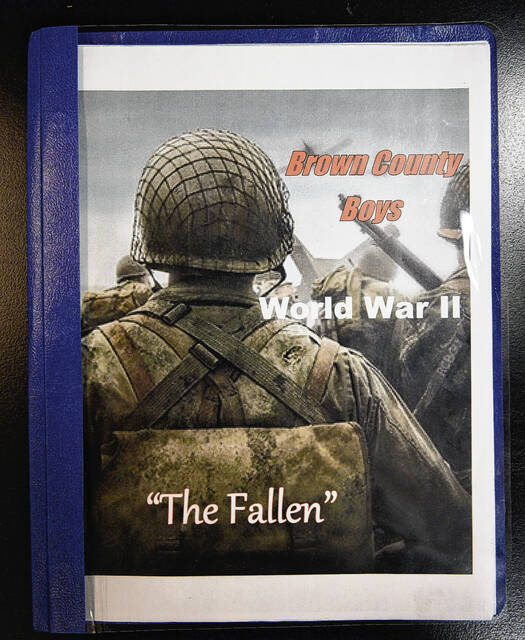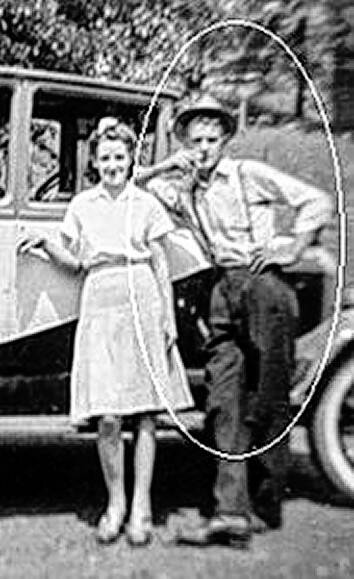


There had been talk after the successful D-Day invasion of Normandy in June 1944 that our boys in Europe might be headed home by Christmas.
Some of this was rumor and “scuttlebutt” among the enlisted, but a flood of Ultra intercepts of German code messages had given rise to an overconfidence by allied leaders. The Ultra intercepts revealed a deepening despair among some Nazi generals to the point that some of them attempted to assassinate Hitler in July.
This allied overconfidence had a great effect on the two major military operations that would dominate the news in the latter half of 1944.
One was the Market Garden operation in Holland and the other the Battle of the Bulge in Belgium. These two actions would deflate that allied overconfidence and ensure that the war would continue into 1945.
Nineteen-year-old Marvin Tutterrow of Helmsburg would play a part in both of these major confrontations.
Tutterrow, who was known as “Jeep” by his many friends, had just turned 19 in August. He had entered service in September of 1943 and took his infantry training in Alabama.
No sooner than arriving in England in April of 1944 Tutterow decided to volunteer for the Screaming Eagles and become a member of the 101st Airborne paratroopers. After completing his paratrooper training and proud of his accomplishment Tutterrow sent his “wings” home to his mother.
The Market Garden operation was the idea of British General Bernard Montgomery who then was able to get Supreme Allied Commander Dwight Eisenhower to OK it. The goal was to secure Holland and focus on capturing the bridge over the Rhine at Arnhem.
The capturing of this bridge would be the gateway to the invasion of northern Germany and coupled with the allied armies sweeping across France towards an invasion of central Germany the thought of a quick end of the war by the conclusion of 1944 seemed possible.
Market Garden, even though it involved multiple units including paratroopers and a great deal of coordination, seemed very workable. That is if the Germans were surprised. Initially they were. But a U.S. staff officer carrying the operational plan into the battle was killed and the Germans discovered the plan. The Germans subsequently altered their defense and although the allies advanced, the Germans blocked them at Arnhem, the allies ultimate goal.
Tutterow was among the Screaming Eagle paratroopers that descended upon Holland. The 1977 film “A Bridge Too Far” is based on the book of the same title by Cornelius Ryan and is a good depiction of this whole operation.
In October when Tutterow hooked up with his brother, Staff Sgt. Leroy Tutterow, both were on furlough in the United Kingdom. It is not hard to imagine Marvin not letting Leroy get a word in as Marvin described his jumping into France after D-Day and then his harrowing experiences as part of Market Garden.
In mid-December the Screaming Eagles were rushed to the town of Bastogne in Belgium. This time they were in trucks and not dropped from airplanes.
The Germans had started a surprise offensive to cut through Belgium and secure the vital port of Antwerp from which the allied armies of Europe were supplied. Within two days the Germans had poured through a gaping hole in the Bulge, or the American line.
Bastogne was deep in the Argonne Forest. To Marvin the terrain must have made him think again of Helmsburg and the hills of Brown County. Although visiting there today one might say it looks like Brown County on steroids.
Capturing Bastogne was the key to the German offensive. The defense of Bastogne by the 101st Screaming Eagles presented a formidable obstacle to the surging German armored tanks. In the ensuing days the encircled 101st engaged in vicious fighting in the snow covered hills. It was at this time on Dec. 23, 1944 that Marvin suffered injuries that would end his life.
The holding action at Bastogne caused the Germans to use up valuable fuel and they were unable to keep their tanks moving. The weather eventually cleared allowing the allied air superiority to put an end to the German counter offensive.
On Saturday, Jan. 1, 1945, Marvin’s mother, Goldie, was informed by the war department that her son had died in Belgium on Dec. 23. For the Tutterow family it was one terrible tragedy added to another. Otto Tutterow, Marvin’s father, after a long illness had actually died the day after Marvin on Christmas Eve.
Marvin had four brothers and three sisters: Leroy (U.S. Army), Raymond (U.S. Navy), Fred, Lloyd, Helen, Ruby and Sarah.
Marvin is buried in the American Cemetery Luxembourg and he is remembered with a memorial marker at the Oak Ridge Cemetery in Helmsburg.
EDITOR’S NOTE: In this reoccurring column, resident Jim Watkins will share more about the lives of the fallen WWII soldiers from Brown County with the community.

